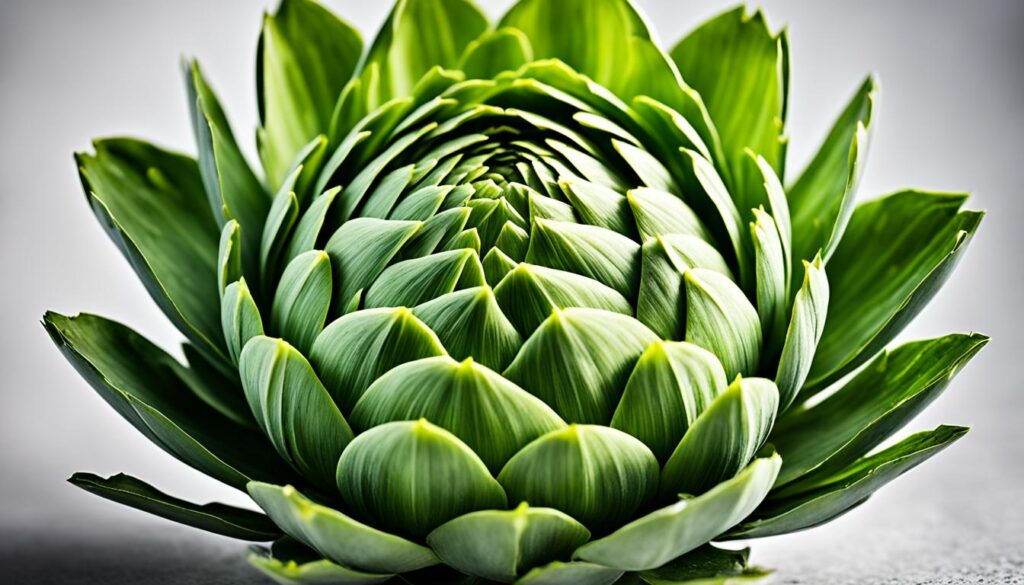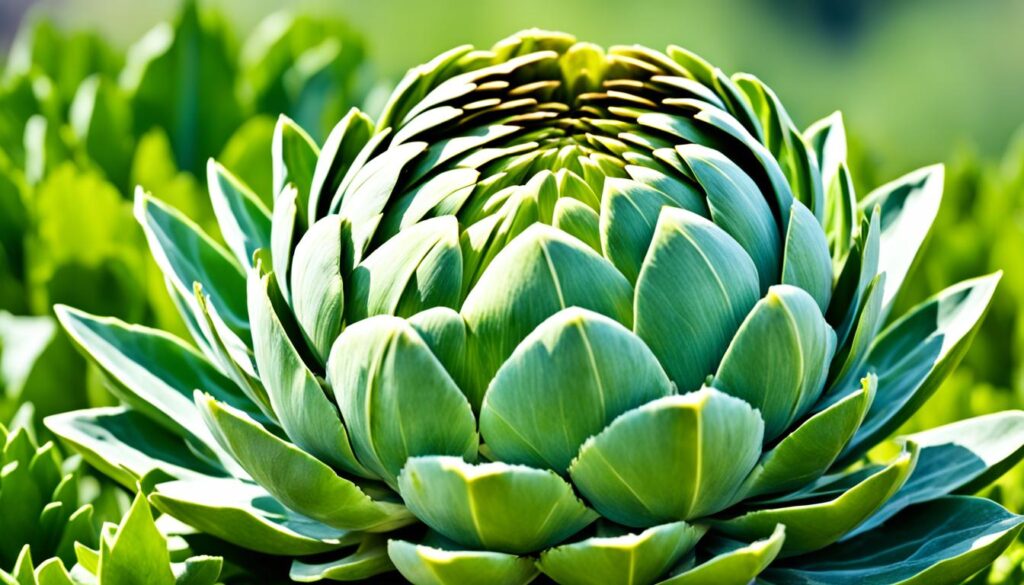Have you ever thought about the artichoke’s nutritional value? This thistle from the Mediterranean is full of surprises. It’s rich in vitamins and minerals, and it could boost your health. But why is it so good for you, and how can you add it to your meals? Let’s explore the artichoke’s secrets together.
Artichoke: A Nutritional Powerhouse
Artichokes are a superfood full of vitamins, minerals, and antioxidants. A single cooked cup has only 90 calories but packs 20g of carbs, 10g of fiber, and 5g of protein. They are loaded with folate, vitamin C, magnesium, copper, and potassium. This makes them great for any diet.
Packed with Vitamins and Minerals
Artichokes are full of important nutrients. One cooked artichoke gives you over 25% of the vitamin C you need daily. It also has a lot of vitamin K, magnesium, and folate. These help keep your immune system strong, support bone health, and make red blood cells.
Rich in Antioxidants and Fiber
Artichokes are also known for their antioxidants. They have rutin, quercetin, silymarin, and gallic acid, which fight inflammation and disease. Plus, they’re a great source of fiber, giving you over 28% of your daily fiber needs. This fiber helps with digestion, keeps you feeling full, and controls blood sugar.
| Nutrient | Amount per Cooked Cup (170g) | Percentage of Daily Value |
|---|---|---|
| Calories | 90 | – |
| Carbohydrates | 20g | – |
| Fiber | 10g | 28% |
| Protein | 5g | – |
| Vitamin C | 25mg | 28% |
| Magnesium | 50mg | 12% |
| Folate | 170mcg | 43% |

Artichoke: Potential Health Benefits
Artichokes and their extracts could be good for your health. They might help with cholesterol and blood pressure. Studies show they’re good for your heart.
Improving Cholesterol Levels
Artichoke leaf extract can lower bad cholesterol and triglycerides. This is thanks to compounds like luteolin. It stops cholesterol from forming and helps process it better.
A study in the International Journal of Food Sciences and Nutrition in 2013 found it helped lower bad cholesterol. This was in people with high cholesterol who didn’t take any medicine.
Regulating Blood Pressure
Artichoke extract can also help with blood pressure. It might do this by making blood vessels wider. Artichokes are full of potassium, which also helps lower blood pressure.
A review in the Clinical Nutrition Research journal showed artichoke supplements can lower blood pressure. A study in Complementary Medicine Research 2020 found it helped with blood pressure and weight in people with high blood pressure.

Artichokes and their extracts look like they could be good for your heart. They might help with cholesterol and blood pressure. Adding them to your diet could be a natural way to keep your heart healthy.
Artichoke: Supporting Digestive Health
Artichokes are more than just tasty; they’re full of fiber and prebiotics. These can help keep your gut healthy. Studies show artichokes can improve your digestion.
Easing Irritable Bowel Syndrome Symptoms
Artichoke extract might help those with irritable bowel syndrome (IBS). A 2004 study found it cut IBS symptoms by 26%. It also reduced indigestion by 41%.
Artichokes have fiber, prebiotics, and might help with spasms. This could ease IBS and indigestion. They support a healthy gut and better digestion.

The FDA doesn’t suggest how much artichoke extract to take. Always talk to a doctor first. There could be allergic reactions or interactions with medicines. More studies are needed to prove its health benefits.
Artichoke: A Potential Aid for Liver Health
Artichoke is a tasty and healthy veggie that might help your liver. Studies show artichoke extract can protect the liver and help new liver tissue grow. It does this by making more bile. Bile is key in removing toxins from our bodies.
Many studies look into how artichoke can protect the liver. A 2016 study in the International Journal of Hepatology found artichoke extract helped 30 adults with liver issues. Another study in 2018, in Nutrients, showed artichoke leaf extract helped obese rats with metabolic syndrome. But, we need more human studies to be sure.
Artichokes are full of antioxidants and anti-inflammatory stuff. These help protect the liver. Artichoke extract can lessen inflammation and boost liver function in people with fatty liver disease.
Even though artichokes look good for liver health, we need more research. Remember, supplements can cause side effects like gas or diarrhea. Always talk to a doctor before taking artichoke supplements.
Incorporating Artichokes into Your Diet
Artichokes are easy to add to your meals in many ways. The edible parts are the leaves and the heart. You can steam, boil, grill, roast, or sauté them. Then, dip the leaves in sauces or add the heart to dishes like pizza or salad.
Canned or jarred artichokes are also handy. They’re great for dips, pasta, or stir-fries. They taste sweet and earthy, making them a tasty, healthy choice for many meals. The article shows how canned artichokes can be used in many dishes, like pastas, salads, chicken dishes, and sandwiches.
Choosing fresh or canned artichokes, these veggies are packed with nutrients. They have lots of vitamins, minerals, and antioxidants. Adding artichokes to your meals is an easy way to get more nutrition and enjoy your food more.



